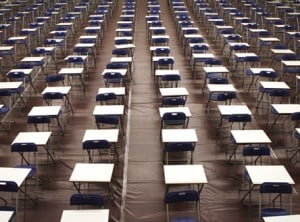NCBE Dismisses 114-Page Academic Report As 'Fake News'
The facts are what the NCBE says the facts are!!!
 It’s recently come to my attention that our Thinking Like A Lawyer podcast has gotten bad reviews because we “talk too much about the bar exam.” Trust me, I’d love to talk about other subjects, but 2020 has brought non-stop bar exam disasters while simultaneously sparking the most wide-spread, serious conversation about licensure alternatives in my tenure as a legal journalist. (So, if you like us talking about the bar exam… consider hopping over and giving us some nice reviews!)
It’s recently come to my attention that our Thinking Like A Lawyer podcast has gotten bad reviews because we “talk too much about the bar exam.” Trust me, I’d love to talk about other subjects, but 2020 has brought non-stop bar exam disasters while simultaneously sparking the most wide-spread, serious conversation about licensure alternatives in my tenure as a legal journalist. (So, if you like us talking about the bar exam… consider hopping over and giving us some nice reviews!)
One of the most ambitious studies of licensure is the IAALS study, co-authored by Professor Deborah Merritt. We spoke recently with Aaron Taylor of AccessLex, who helped fund the report. It’s a massive undertaking and state legislatures, supreme courts, bar associations, or whatever agency oversees your state’s licensing process, should be giving it a detailed read immediately.
So what does the NCBE think of the report?

The Business Case For AI At Your Law Firm

The phrase “does not appear to be based on data,” faces stiff competition for the title of “Dumbest Thing The NCBE Said In 2020” but it’s a strong contender. The IAALS study, as it turns out, relies on a lot of data including raw data gathered by… NCBE! On top of that, the IAALS report also ran 50 focus groups and transcribed over 75 hours of discussion and boasts over 500 footnote citations.
So, you know, “YEEHAW! Fake News!” Take that “critical reading skills!”
When the dust settles from the political hellscape America is living through, the degradation of argumentation skills will be recognized as one of the worst developments of these years. Blowing off 114 pages as if it’s not based on data? There are a lot of dumb things that can be said over 114 pages, but you have to at least engage them on their merits rather than shrugging and pretending all those footnotes aren’t real.
Sponsored

Early Adopters Of Legal AI Gaining Competitive Edge In Marketplace

Navigating Financial Success by Avoiding Common Pitfalls and Maximizing Firm Performance

Is The Future Of Law Distributed? Lessons From The Tech Adoption Curve

Navigating Financial Success by Avoiding Common Pitfalls and Maximizing Firm Performance
It’s not so much that a supposedly professional organization thought to issue such a facially false claim, it’s that it believes, probably correctly, that doing so will actually work. There will be enough people in positions that matter that will never crack open this report and will swallow — and uncritically repeat — the claim that “oh, that report wasn’t based on real data.”
The irony is that the IAALS report isn’t simply pushing a diploma privilege model that would obviate the need for a centralized licensing exam clearinghouse. While there is obviously a diploma-centered suggestion (which is the right suggestion), the study also provides an option that maintains testing for subject-matter with reforms based around ascertaining research skills rather than rote memorization and an experience-based option that reduces but doesn’t eliminate testing. In either of these worlds, the NCBE could position itself as a partner to state licensing agencies. That its knee-jerk reaction to a thoughtful, data-driven study is to double-down on the failing model that they already employ is a testament to how the organization has ceased to take its mandate as a professional licensing body seriously and transitioned fully into a business selling testing materials.
But this is where we are: one side of this argument is devoting resources to undertaking a wide-ranging research operation and the other is making up stuff about the study. And, sadly, I can’t say for sure that the former is in a better position with most audiences.
Earlier: What Would Be Better Than The Bar Exam?
Because The Bar Exam Wasn’t Screwed Up Enough, State Tells Celebrating Applicants ‘Sorry, You Actually Failed’
Sponsored

Legal AI: 3 Steps Law Firms Should Take Now

The Business Case For AI At Your Law Firm

 Joe Patrice is a senior editor at Above the Law and co-host of Thinking Like A Lawyer. Feel free to email any tips, questions, or comments. Follow him on Twitter if you’re interested in law, politics, and a healthy dose of college sports news. Joe also serves as a Managing Director at RPN Executive Search.
Joe Patrice is a senior editor at Above the Law and co-host of Thinking Like A Lawyer. Feel free to email any tips, questions, or comments. Follow him on Twitter if you’re interested in law, politics, and a healthy dose of college sports news. Joe also serves as a Managing Director at RPN Executive Search.







